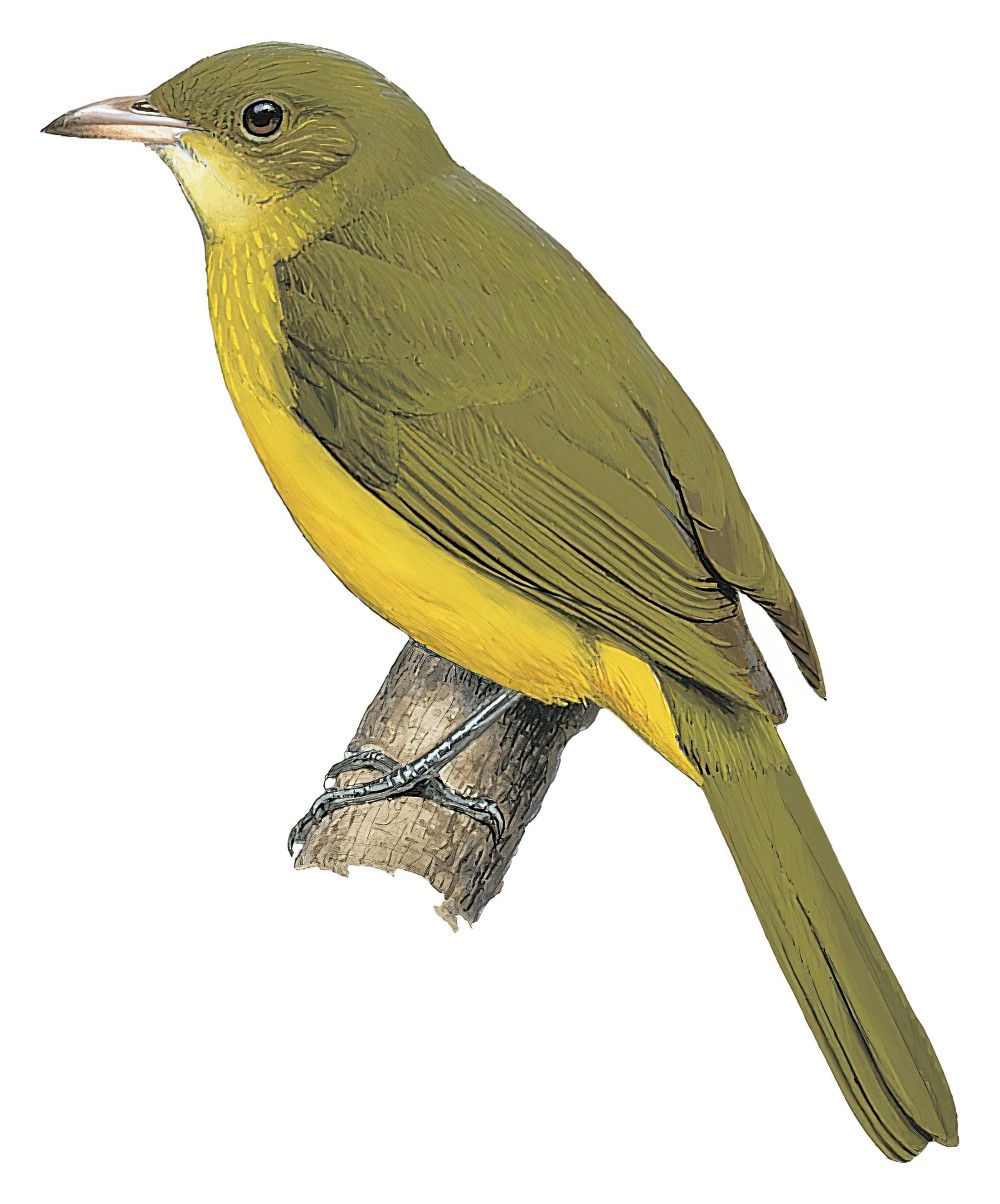Golden Greenbul / Calyptocichla serinus

Golden Greenbul
SCI Name:
Protonym: Criniger serinus J.Orn. 3 p.105
Taxonomy: Passeriformes / Pycnonotidae / Calyptocichla
Taxonomy Code: golgre1
Type Locality: Gabon.
Author: Verreaux, J & Verreaux, E
Publish Year: 1855
IUCN Status: Least Concern
DEFINITIONS
CALYPTOCICHLA
(Pycnonotidae; Ϯ Golden Greenbul C. serinus) Gr. καλυπτος kaluptos covered < καλυπτω kaluptō to conceal; κιχλη kikhlē thrush; “CALYPTOCICHLA 1 nom. nov. Trichites HEINE, Journ. f. Ornith., 1860, p. 139 (type Criniger serinus Verreaux) (nec Lycett 1850). Chars. gen.—Similar to Stelgidillas, but nasal operculum densely feathered quite to anterior margin; bill relatively shorter, higher than broad at anterior edge of nostrils, its height at base about equal to one-third the length of exposed culmen; culmen much more curved; rictal bristles weaker. ... Type.—Criniger serinus VERREAUX. This genus is notable for its closely and completely feathered nasal operculum, in which respect it is differentiated from all its allies. It seems undoubtedly to be most nearly related to Stelgidillas, but is in many respects intermediate between the latter and Andropadus. With other genera, already treated, it scarcely needs comparison. The name Trichites, long ago given to this group by Heine, is preoccupied by Trichites Lycett, for a fossil mollusk, and has therefore been replaced by the name above used. The type is the only species, and should stand as: Calyptocichla serina (Verreaux). ... 1 καλυπτος, coöpertus; κιχλη, turdus.” (Oberholser 1905);"Calyptocichla Oberholser, 1905, Smiths. Misc. Coll., 48, p. 165 (for Trichites Heine, 1860; not Trichites Lycett, 1850). Type, by original designation, Criniger serinus." (Rand in Peters, 1960, IX, p. 259).
Synon. Trichites.
SERINUS
(Fringillidae; Ϯ European Serin S. serinus) Specific names Loxia Serinus Scopoli, 1769, and Fringilla Serinus J. Gmelin, 1789; "LIII. Gattung. Girlitz. Serinus. (Tab. VI. A. Fig. 50.) ... Ein niedliches Vögelchen mit dickem weichfederigem Kopfe, etwas leichtem Körper, langen etwas breiten Flügeln und einem ziemlich kurzen, breiten, gabelförmigen Schwanze. Die sehr kurzen, schwachen Füße sind zum Hüpfen, die vier Zehen mit schwachen gebogenen Nägeln versehen. Seine Nahrung besteht in allerlei Samen. Eine Art. 143. Gelbbrüstiger Girlitz. Serinus hortulanus. Grüngelb; der Oberleib schwärzlich und rost-grau gefleckt; Kehle und Brust bis fast in die Mitte des Bauchs schön grüngelb. Loxia serinus. Gmel. Lin. S. I. p. 908. n.17. = Meyers und Wolfs t. p. 146. Fringilla citrinella. Bechst. orn. T. p. 123." (Koch 1816); "Serinus Koch, 1816, Syst. Baierischen Zool., Säug. Vögel, 1, p. 228, pl. 6A, fig. 50. Type, by monotypy, Serinus hortulanus Koch = Fringilla serinus Linnaeus." (Rand in Peters 1968, XIV, 208). In ornithology this name has been associated with a variety of European finches.
Var. Serinsu.
Synon. Alario, Canaria, Chlorindus, Crithologus, Dryospiza, Metoponia, Oraegithus, Pronospiza.
serinus
French Serin canary, serin (origin obscure; said to be a corruption from L. citrinus citron-coloured, or cerinus waxy-yellow, but Cabard & Chauvet 2003, refer to Med. Provençale Serena bird that feeds on bees < Gr. σειρην seirēn, σειρηνος seirēnos unknown small singing bird; Gessner 1555, gives the Italian names of this bird as Serin and Scartzerino).
● ex “Serin” of Brisson 1760 (Serinus).
UPPERCASE: current genus
Uppercase first letter: generic synonym
● and ● See: generic homonyms
lowercase: species and subspecies
●: early names, variants, mispellings
‡: extinct
†: type species
Gr.: ancient Greek
L.: Latin
<: derived from
syn: synonym of
/: separates historical and modern geographic names
ex: based on
TL: type locality
OD: original diagnosis (genus) or original description (species)












